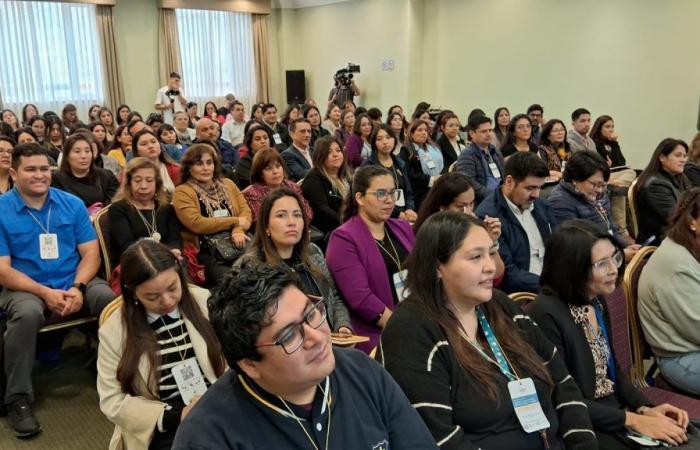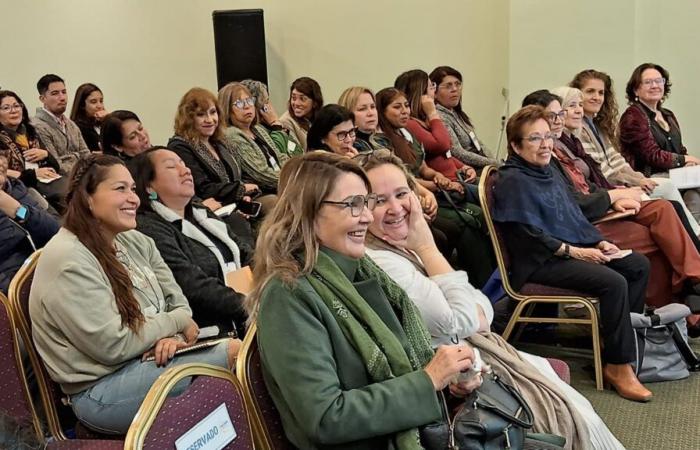As a result of an agreement between Mineduc, Unicef and Valoras UC, educational establishments in Tarapacá addressed issues of access to education, pedagogical inclusion and interculturality, educational coexistence and mental health.
With the aim of reflecting as a community on the challenges and good practices for the inclusion of foreign students and good coexistence, the Seminar “Learning and living together in diverse classrooms: challenges and strategies” was held in Iquique. The initiative, organized jointly by the Ministry of Education, Unicef and Valoras UC, is part of the closing activities of the More Inclusion Tarapacá project.
During the seminar, which brought together directors, heads of UTP, teachers, school coexistence managers, educators and education assistants from the Tarapacá region, attendees were able to reflect on access to education of migrant students, incorporation of intercultural pedagogical tools in the classroom, promotion and respect for diversity, good treatment and peaceful resolution of conflicts in school coexistence and containment and referral in mental health.
Liliana Valenzuela, Seremi (s) of Education welcomed those summoned, emphasizing the value of this meeting within the framework of the Policy on Children and Foreign Students of the Ministry of Education: “It is very important that these days take place in which we talk about topics that are relevant to educational communities as they directly affect the results of learning achievements, which is what brings us together and challenges us as a region and Ministry of Education. We are addressing inclusion and coexistence linked to a very important phenomenon that is migration and by looking at it from a training and pedagogical perspective, we can develop interculturality and work with the migrant population and their familieswith appropriate strategies and tools to achieve healthy, peaceful interactions that bring us excellent learning results.”
During the seminar, two educational establishments in Iquique and Alto Hospicio They presented their good practices regarding the inclusion of migrant students. One of them corresponded to the interactive fair of the Liceo Técnico Profesional de Adultos de Iquique.
Nancy Perez, Director of the Iquiqueño campus highlighted the need to work in support networks. “We held an interactive fair in which we brought 32 public and government services to our students because since they do not have 4th grade and have jobs without a contract, they do not have time to go and learn about all the benefits. The response from the students has been wonderful. because they actively participate, interacting and clarifying all their doubts. Health personnel, from the municipality, Omil attend the fair to consult about their employment contract, Serviu, CFT and Universities, institutions that have been with us for 5 years because this is the fifth fair we have held.”
The topics addressed in the seminar included: “Promotion of emotional well-being in the school environment” by the child and adolescent neuropsychiatrist, Amanda Cespedes; “Language teaching in intercultural contexts: keys to educational inclusion” presented by Gloria Toledo, specialist in Linguistics and doctor in Philology and “Classroom strategies for pedagogical inclusion” presented by Cecilia Sotomayor, Specialist in Project-Based Learning (PBL) and Minga Educa rapporteur.
Pablo Alfaro, Unicef Education Officer, highlighted the importance of participation to guarantee the right to education. “We are very happy for the possibility of being here today, learning and reflecting on inclusion and diversity. This is very necessary to guarantee the right to education of all children and adolescents and one of the groups that concerns us due to their vulnerable situation are foreign or mobile children and adolescents. So we are very happy about the willingness to learn from all the professionals who are here.”
Viviana Hojman, Director Valoras UC highlighted the importance of addressing the challenge of inclusion from the classroom. “What we are doing in this seminar is trying to work on these challenges in the classroom, in language, working collaboratively so that children can learn and, finally, in the development of well-being and emotional development and cHow do we make these classrooms They are classrooms where one grows, learns, is entertained and develops.”
More Inclusion Tarapacá is an initiative that arises from an alliance between the Ministry of Education, Unicef Chile and the Valoras UC School Coexistence program and which is aimed at reflecting in community on the challenges and good practices inclusion of foreign students and school coexistence. This project was developed from November 2023 to May 2024 with educational establishments that signed up for this initiative.







